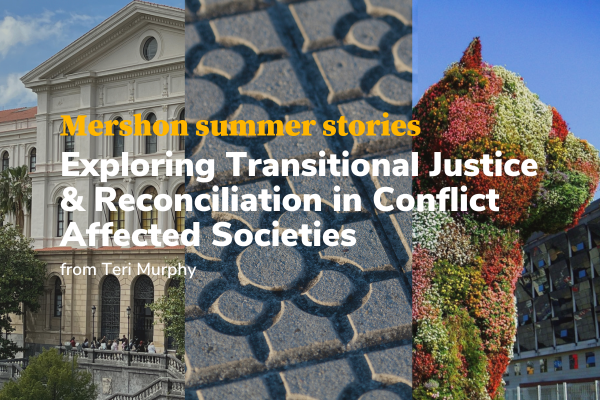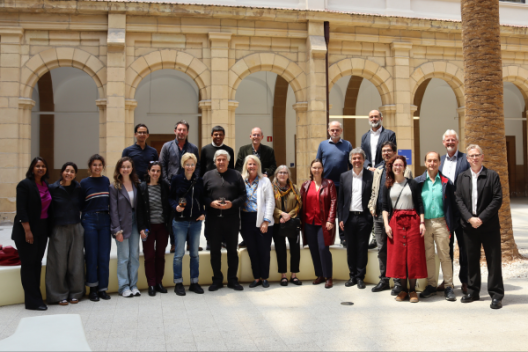Exploring Transitional Justice & Reconciliation in Conflict Affected Societies

Mershon's faculty and graduate student grants funded some extraordinary research last summer! This week we highlight the work of associate director, Teri Murphy, and the Mershon Center project exploring transitional justice and reconciliation in conflict affected societies.

The Mershon Center for International Security Studies has launched a two-year research project titled “Reconciliation(s) in Changing Political Landscapes: A Comparative Study of the Basque Country, Colombia, and Northern Ireland.” This initiative, which commenced in May, seeks to analyze the interaction between peace processes, transitional justice, and reconciliation in regions affected by intra-state conflicts.
To kick off the project, the Mershon Center, in collaboration with the University of Deusto, hosted a workshop titled “The Road from Transitional Justice to Reconciliation” in Bilbao, Spain. The workshop brought together an international team of peace negotiators, legal experts, and practitioners to analyze the relationship between the four fundamental pillars of transitional justice—truth, justice, reparations, and non-recurrence—and the broader goal of reconciliation.
Teri Murphy, Associate Director for Peacebuilding Research at the Mershon Center and Principal Investigator for the project, emphasized the often-overlooked aspect of reconciliation in post-conflict settings. “Many civil wars conclude with negotiated settlements that prioritize the cessation of armed conflict, disarmament, and demobilization. These agreements frequently elevate state security over transitional mechanisms aimed at truth, justice, and reconciliation, which are often seen as secondary or apolitical,” Murphy noted. She further explained that achieving a durable and positive peace is a complex process that demands engagement at multiple levels. “It is critical to involve the whole of society—not just political and military elites—in addressing past injustices and negotiating a shared future. When justice is not served, trust is eroded. Trauma and grievances are transmitted across generations, and violence becomes chronic. Failing to address these legacies may generate new cycles of violence and put peace at risk.”

The study aims to highlight how political and social reconciliation can play a crucial role in preventing violence and fostering secure, peaceful societies. The success of these efforts depends on a variety of factors including the quality of peace agreements and their implementation strategies, broad and inclusive stakeholder support, the integration of formal and informal mechanisms, and the impact of changing political landscapes. By examining peace processes in the Basque Country, Colombia, and Northern Ireland, the Mershon Center’s research team aspires to offer valuable insights into these dynamics in ways that might enhance future negotiations, improve transitional justice practices, and contribute to sustainable peacebuilding in regions recovering from conflict.
The project brings together academic experts from several international institutions and universities including Bradford University (UK), Brunel University (UK), Colombia’s Truth Commission (Colombia), Georgetown University / Guernica 37 Group (USA), Inter-American Court of Human Rights (Costa Rica), OSCE Academy (Kyrgyzstan), Philipps-University Marburg (Germany), Pontificia Universidad Javeriana (Colombia), Queen’s University (Northern Ireland), Ulster University (Northern Ireland), University of Basque Country (Spain), University of Deusto (Spain), University of Leuven (Belgium), University College Stockholm (Sweden), and Utrecht University (The Netherlands).
